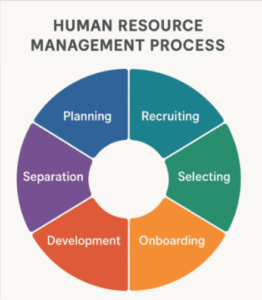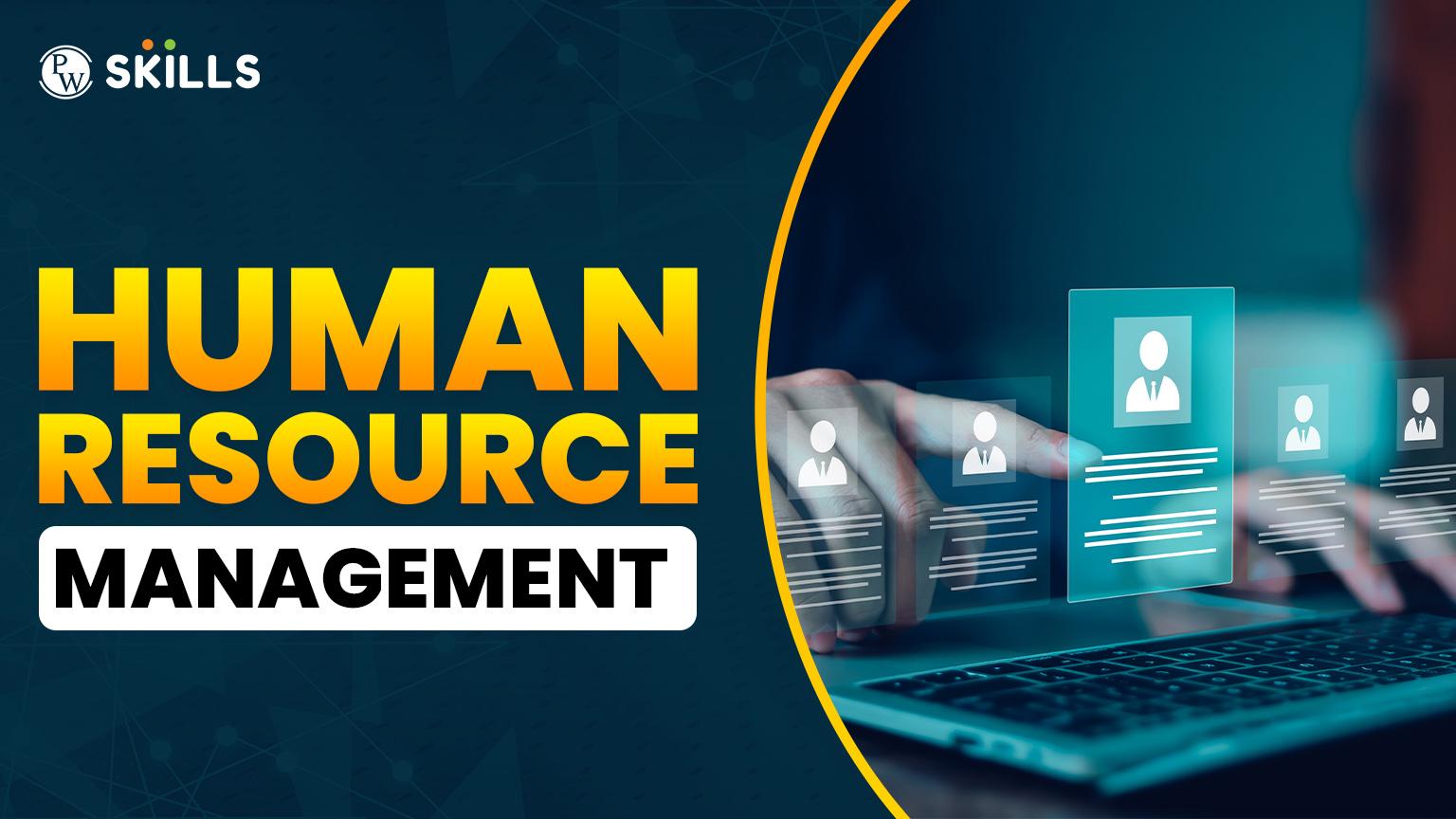Companies have two fuels: money and people. Money acts as petrol to run a car, meanwhile, people are the drivers, the GPS, the mechanics, and occasionally even the emergency tow trucks. Here comes Human Resource Management (HRM) into the picture. Without Human Resource Management, even the richest companies would look like a circus without a ringmaster-chaotic, noisy, and going nowhere.
Now, come let us roll up our sleeves and answer the question: What is Human Resource Management? Most importantly, why should this concern you, a student or working professional?

What is Human Resource Management?
At its simplest, Human Resource Management (HRM) means hiring, managing, and developing employees so that they contribute effectively to an organization’s goals. Think of HRM as that bridge between company strategy and employee happiness.
In simple language, HRM is the art and science of making work work-for the company as well as for the worker.
What is Human Resource Management and Its Importance?
Why is HRM actually so important? Just think of a cricket team without a coach. The players may have good abilities, but without proper guidance, discipline, and role clarity, the entire team will collapse. Just like that, organizations without HRM would be subject to confusion, low productivity, and no end to resignations.
Importance of Human Resource Management can be summed up as:
- Recruit the right team.
- Train employees for growth with the organization.
- Maintain fair compensation and benefits.
- Create the environment in which people are motivated enough to produce results.
- Act as moral compass for workplace ethics.
HRM doesn’t just fill seats; it builds careers, creates culture, and drives results.
The Functions of Human Resource Management
If HRM was a smartphone, the ‘apps’ (functions) would be like this:
- Recruitment and Selection
Its matchmaking at the right time with the right talent and then matching with the company need against human potential.
- Training and Development
Providing employees tools to better do their jobs and make tomorrow better than yesterday.
- Performance Management
Includes not only annual reviews but also feedback giving, goal setting, acknowledgment of positive performance.
- Compensation and Benefits
From salaries to a gym membership and flexible hours, HRM ensures employees are rewarded fairly.
- Employee Relations
Handling grievances, keeping communication above board, and preventing office politics from turning into Game of Thrones.
- Compliance with Laws
HRM provides the company with a record so that it keeps itself on the right side of the law according to labor laws and workplace safety standards.

Role of HRM Concerned with an Organization
HRM role concerned with an organization does not end with appointment or dismissal; it concerns making the whole workplace ecosystem where:
- Employees feel valued.
- Teams are aligned with the organizational targets.
- Respect diversity and inclusion.
- Innovation is not hampered by red tape.
An otherwise typical nexus of individuals transforms into a community that breathes life into existence with HRM.
Explained Human Resource Management Process
The HRM process is broken down into a neat cycle called:
- Planning – Understanding the organization’s future workforce needs.
- Recruiting – Attracting the right candidates.
- Selecting – Deciding who fills the role best.
- Onboarding – Welcoming employees and connecting them to the culture.
- Development – Training currently for the roles they have but also preparing for future leadership.
- Retention – Where the ‘top’ keep flourishing.
- Separation – Treating resignations, retirements, and exits with dignity.

Keep repeating this cycle endlessly because businesses, like people, are ever-changing.
Different Types of Human Resource Management Practices
Different companies, different flavors of HRM:
- Strategic HRM – when HR aligns with company long-term objectives.
- Operational HRM – Day-to-Day management of the workforce.
- Talent Management – Leading the pack, focused on high performers and leadership development.
- Global HRM – Management of cross-border teams in multinational firms.
- Tech-Driven HRM – They leverage AI HR software for efficient management of people.

Importance of HRM for Employee Development
People don’t want just a paycheck; they demand growth. HRM provides:
Skill-building opportunities on a continual basis.
- Mentorship programs.
- Career path planning.
- Leadership grooming.
Thus making HRM the career architect for the employees, letting them climb ladders rather than trapping them on the same rung.
Real-Life Application of Human Resource Management
- Startups use HRM to attract early talent willing to take risks.
- Tech companies invest heavily in HRM to retain developers who could easily jump ship.
- Manufacturing companies rely on HRM to keep large workforces safe, motivated, and efficient.
- Remote companies lean on HRM to build culture virtually.
Each industry has its own flavor when it comes to HRM, but generally, all these flavors have that secret ingredient called people.
Career Opportunities in Human Resource Management
If you want to take up HRM as a career, here’s the buffet:
- Generalist HR – Jack of all HR trades.
- Recruitment Specialist – The talent hunter.
- Training & Development Manager – The workplace teacher.
- Compensation & Benefits Analyst – The salary scientist.
- HR Business Partner – Strategy + people expert.
- CHRO (Chief Human Resource Officer) – The HR captain of the ship.
Salary Insights
Entry-level HR professionals in India earn nearly ₹3-5 LPA. Mid-level managers, with experience gain ₹10-18 LPA. Senior HR leaders? They can pull in ₹40 LPA+ depending on the industry.
In most parts of the world, HR salary growth curve has this grain, honeycombed with specialization in analytical aspects or global HR during the course of the career.

Sources – Payscale, Glassdoor, AmbitionBox, Naukri.com, SHRM.
A Practical Guide to Learning Human Resource Management
- Building Foundations – Know the What And Why of HRM.
- Understand Labor Laws – The common rules of game play for all HR professionals.
- Get Some Practical Knowledge – It can include internship, project work, or just working on an HR software package like SAP or Workday.
- Develop skills with people – Communication skills, empathy, and conflict resolution.
- Establish Areas of Specialization – Recruit, analyze data, or organize development within your company, for example.
- Keep Updated – Because of changing technology and workplace trends, HRM also undergoes changes.
Comparatively HRM with Other Management Fields
- Finance vs. HRM: finance is all about money; HRM is about managing people. Both of them are resources. Only one, however, can storm out of the office.
- Marketing vs. HRM: Marketing sells its product to consumers; HRM sells the company culture to its employees.
- Operations vs. HRM: Operations build processes; HRM builds people to run those processes.
HRM is the human heartbeat in all those fields.
Common Mistakes in Human Resource Management
- Too much reliance on gut feeling is not enough to recruit.
- Ignoring Diversity and Inclusion.
- Not using modern ways of doing performance reviews.
Why Learn About Human Resource Management?
It is because businesses will always need people, and people will always need guidance, development, and treatment that is fair in the workplace. This is the crossroads with HRM.
For students, a steady and growing career path is to follow HRM. For working professionals, HRM skills will make you a better manager, leader, or entrepreneur.
What is the future of Human Resource Management?
AI integistration methods-predictive analytics concerning wastage of employees and hybrid workplace strategies are rewriting the HRM playbook. Tomorrow’s HR professionals will learn to combine these two aspects.
Put differently, robots may write job descriptions, but only humans know what makes another human tick.

Why Human Resource Management?
Human Resource Management is not just paper and payroll-it’s about people, purpose, and progress. Whether you elect to make HRM your career or simply want to understand the beating heart of organizations, Human Resource Management knowledge is here for life.
Also Read:
- 7 Ways to Improve Your Writing Skills: Working Tips For Beginners & Professionals
- Top 30 Excel Formulas And Functions You Should Know
- Top 10 Toughest Courses in India (2025)
- 4 Underrated Skills That Are Worth Up To $100,000+ In 2025
Choose PW Skills for Your Journey
Want to master any field and future proof your career? PW Skills offers industry relevant courses tailored to the needs of both freshers and experienced people. Learn from the masters and get hands-on experience while acquiring skills valued by employers. Join us today to become the one that every organization longs for.
In short, recruitment, training, performance management, compensation, employee relations, and compliance. Indeed, HRM offers stability, growth, and the chance to work in different industries with competitive salaries. Fair payment, continuous learning, career development, and favorable working conditions will all be ensured. Tech-savvy: AI recruitment, HR analytics, remote team management, and hybrid workplace models.Human Resource Management FAQs
What are the major functions performed in Human Resource Management?
Is Human Resource Management a good career?
How does HRM help employees?
What future holds for HRM?


